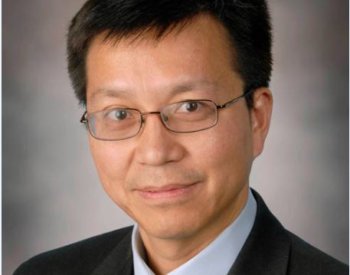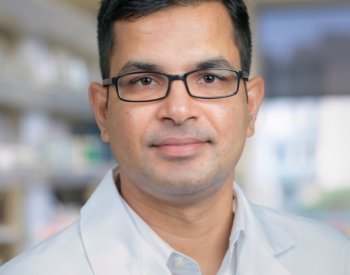SAN ANTONIO (Aug. 27, 2019) ̶ UT Health San Antonio received more than $1 million from the Cancer Prevention Research Institute of Texas in its summer round of funding, announced Aug. 22.
The largest award, $892,157, went to Yidong Chen, Ph.D., a professor of population health sciences in the Joe R. and Teresa Lozano Long School of Medicine. Yogesh Gupta, Ph.D., an assistant professor in the Department of Biochemistry and Structural Biology, and the Greehey Children’s Cancer Research Institute, received a high-impact, high-risk award of $199,996. A UT Health San Antonio-related spinoff company also received a $3 million seed award for product development.
Developing new ways to use big data

Dr. Chen is director of the computational biology and bioinformatics program in the university’s Greehey Children’s Cancer Research Institute. He also is co-director of the Next-Generation Sequencing Shared Resource.
Computational science uses big data to develop models and algorithms to better understand biological systems and relationships. Dr. Chen’s CPRIT award is “Predicting drug response from genomic data using deep learning methods.”
“The technological breakthrough in deep learning, part of artificial intelligence (AI), has revolutionized industries, automation and biomedical research. Its impact is only beginning to be felt in our daily life. Some examples are AI-enabled consumer products and autonomous driving cars,” he explained.
“Many of these sophisticated deep-learning algorithms have not yet been adapted to harness the knowledge from ever-increasing genomic data. The data comes from such sources as the Cancer Genome Atlas, which is a database of more than 20,000 tumors across 33 tumor types, the Cancer Cell-Line Encyclopedia, with more than 1,000 cell lines, as well as enormous therapeutic drug-testing results,” Dr. Chen said.
“Recently, we have developed a novel algorithm model to predict drug response based on the TCGA and CCLE data. The new grant will help us develop this model and allow us to more accurately predict the effectiveness of therapeutic drugs, prioritize treatments, accelerate the discovery of new agents and help us bring new AI techniques to translational research,” he added.
In May 2016, Dr. Chen received $3.6 million from CPRIT to update and expand existing infrastructure to establish the Cancer Genome Sequencing Facility and Computational Core for the South Texas community through UT Health San Antonio. In 2012, he received $816,000 from CPRIT for his collaborative work with UT Southwestern Medical Center to study treatable genetic abnormalities in sarcoma patients.

Understanding the mechanisms of pediatric cancer
Dr. Gupta’s laboratory is studying the three-dimensional structures and function of certain enzymes and how they change the architecture of genetic material leading to pediatric cancers. One of the genetic processes he is studying is called chromatin remodeling by BAF complex. The BAF complex consists of more than 15 different proteins.
In malignant cells and especially in pediatric cancers, both the assembly and recruitment of the BAF complex proteins are disrupted by mutations, deletions and overexpression of individual proteins resulting in formation of abnormal or defective BAF complexes. Ewing’s sarcoma and synovial sarcoma are examples of pediatric cancers where defective BAF complexes play a central role in forming tumors.
His CPRIT award, titled “Mechanism-based targeting of core molecules of the BAF complex in cancer,” will allow Dr. Gupta to use structural and chemical biology approaches to define how BAF complexes operate in pediatric sarcomas. Dr. Gupta anticipates that this work will lead to the development of more effective treatments for children with highly aggressive tumors of bone and soft tissues that are hard to treat with existing therapies.
Dr. Gupta was recruited to the Greehey Children’s Cancer Research Institute in 2017, when he also was selected for a UT System Rising STARs Award. He received a young faculty investigator award from the Max and Minnie Tomerlin Voelcker Fund in June of this year.
$3 million awarded to a UT Health San Antonio spin-off
CPRIT also awarded $3 million to Emtora Biosciences, formerly called Rapamycin Holdings. The award is for a clinical trial investigating a formulation of rapamycin called eRapa to treat familial adenomatous polyposis. This is an inherited disorder in which noncancerous polyps form in the digestive system early in life. If not removed, the polyps can become malignant.
“Rapamycin continues to be studied globally for various medicinal uses. The UT Health San Antonio team led by Randy Strong, Ph.D., and Dave Sharp, Ph.D., is a key player in the rapamycin ecosystem. Emtora Biosciences, under the guidance of their CEO, Carole Spangler Vaughn, Ph.D., is demonstrating an urgency in delivering an effective medicine where it is needed most, in the patient,” said John Gebhard, Ph.D., assistant vice president of Technology Commercialization at UT Health San Antonio.
“The competition for CPRIT seed awards for product development research is always challenging, as well as promising. Texas is known to be an integral part of oncology therapeutics, and thus, the competition is healthy. However, it is significant not only to Emtora Biosciences, but also to the City of San Antonio for this continued growth to become part of the biosciences hub of South Central Texas. At the end of the day, the excellent science at UT Health San Antonio is being recognized for its translational and transformational value to the patient,” he said.
# # #
For current news from the UT Health Science Center San Antonio, now called UT Health San Antonio™, please visit our online newsroom, like us on Facebook or follow us on Twitter.
# # #
The University of Texas Health Science Center at San Antonio, now called UT Health San Antonio®, is one of the country’s leading health sciences universities. With missions of teaching, research, healing and community engagement, its schools of medicine, nursing, dentistry, health professions and graduate biomedical sciences have produced 36,500 alumni who are leading change, advancing their fields and renewing hope for patients and their families throughout South Texas and the world. To learn about the many ways “We make lives better®,” visit www.uthscsa.edu.

